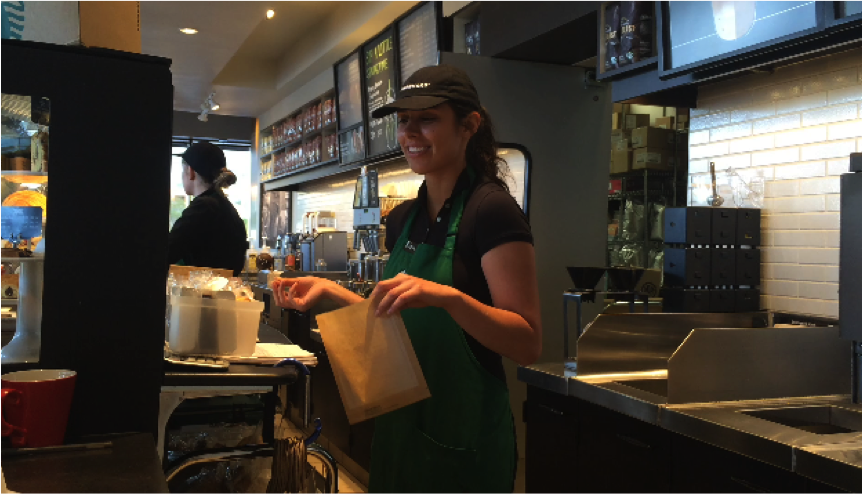Uribe is part of the 17.2% of young working students who are enrolled in the California State University system and she does not have a set schedule for her two jobs, something that happens to nine out of ten young workers in Los Angeles.
By GRECIA LÓPEZ
EL NUEVO SOL
Story in Spanish
Briana Uribe, 21, is a nutrition major at California State University, Northridge and a young worker who carries an agenda wherever she goes.
In the agenda, she writes her school hours, work schedule for two jobs and her gym hours. Uribe is so dependent on her appointment book that she even writes the times when she can eat her meals.
In the mornings, Uribe works as a barista at a local Starbucks; and in the afternoons, she works at her college campus gym.
With her appointment book in hand, Uribe explains that her two work schedules are constantly changing because her co-workers are working students as well.
“I never have a fixed schedule. The only thing that does not change every week is the schedule of my classes,” she says. “Every week my schedule changes because my co-workers are students too, so we all need time to study. It’s crazy! So as soon as my manager sends out the work schedule I write it in my agenda so I don’t forget.”
Uribe is not alone, a report by the UCLA Labor Center says that nine out of ten young workers don’t have a set schedule.
A common problem young workers face is supervisors changing work schedules every week. The UCLA study says that 43.2 percent of young people are notified of their working hours less than a week in advance, 44.8 percent reported between one and two weeks in advance, and only 12 percent are notified two or more weeks in advanced.
This is particularly chaotic for students who have to juggle to meet their school obligations.
A researcher for the UCLA Labor Center, Reyna Orellana, said in the study her and her team found that 34.5% of young workers go to college or high school while working full or part-time.
Uribe is part of the 17.2 percent of young working students who are enrolled in the California State University system and her work schedule is as chaotic fixing six different coffees in less than two minutes.
Uribe reviews what her typical Monday schedule is like. She wakes up at 3:30 A.M; works from 4:15 to 11:00 A.M. at Starbucks. Then, she goes to class from 12:30 to 4:00 P.M., leaving only one hour for her to eat and rest before she goes to her second job on campus from 5:00 to 8:15 P.M., leaving little time to study and sleep.
“Sometimes, my supervisors do not respect my school schedule and have made me miss school because of my work,” she said. “I want to complain to my supervisor, but I bite my tongue because I need the money to survive.”
“Society made us believe that young people use their money to party, but our study shows says otherwise,” said researcher Orellana. “Most young people use their money to pay school fees.”
The UCLA report compared the use of student wages and found that 71.2 percent of young workers use their money to pay for books and 42.8 percent to pay their tuition.
When her Starbucks supervisor realized that Uribe had to go to school, she didn’t giver her many hours of work, which is why Uribe decided to apply for a part-time job at her university.
“Thankfully, I was offered a position at the new CSUN gym,” she said sitting on her bed with a serious look. “It’s difficult to be employed by two jobs because you have dual responsibility as an employee to never miss any day at either job. I don’t have two jobs to have fun, I have two jobs to support myself.”

“Briana Uribe at work. Photo: Grecia López / El Nuevo Sol
“I had to sell my car in order to move to Northridge because I needed money to afford the move,” she says. “My car was the only thing of value I really had. I miss it, but at the same time I don’t have that extra expense of gas.”
The UCLA report shows that 62.1 percent of young workers spend money on a car, which includes gasoline, tires, oil change and car insurance.
“She is a hard worker, she has always been a hard worker,” says Uribe’s boyfriend, Erik Gaeta. “I always drive her to work and school when I am able to; that way, she doesn’t spend money on Uber or Lyft.”
As for her transportation expenses, Uribe shows how much she spends on transportation services such as Lyft and Uber to get to work and to class. She also writes expenses for food and clothing.
“The truth is sometimes I complain about what happens to me with my crazy schedule, but I always think that there are people who do not even have money to eat,” she says. “I think about that and then I thank God for giving me two jobs to survive.
Tags: Briana Uribe Grecia López out-of-control schedules Reyna Orellana UCLA Labor Center YoungWorker





















